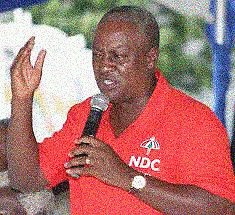
Ghana President John Mahama.
As Sunday, December 9 in Ghana came to its end and the results of the large majority of constituencies had been accounted for in an 80% turnout election, Mahama had 50.70% of the vote, followed by Akufo-Addo with 47.74%. (Twenty-three political parties are registered, but the system is dominated by only two: the National Democratic Congress and the New Patriotic Party.) Preparing for the eventuality of unrest, armored vehicles surrounded the Electoral Commission building in Ghana’s capital, Accra, where a small and short-lived protest had earlier broken out. Several religious and other leaders put out appeals to Ghanaian citizens to eschew violence of any sort, with the concerted message that the winner of the election is Ghana as a whole.
Mahama’s victory will give him a second term in power. His history as Ghana’s president is unique in that he was the vice-president until July 2012, when the then-President John Atta Mills died unexpectedly and Mahama was sworn in as the head of state. For the most part, he has continued Mills’s policies, running a well-organized campaign based on promises to improve the country’s infrastructure and the general lot of Ghanaians, particularly in view of the country’s newfound oil wealth. A scholar and author, Mahama has been described as affable and approachable. His acceptance speech was short, informal and humble — certainly without any of the soaring rhetoric that Americans sometimes expect from their presidents.
For challenger Nana Akufo-Addo, the defeat is particularly stinging, as it is a repeat of much the same result in his 2008 bid. An economist and lawyer by training, he comes from a family of well-known political luminaries in Ghana’s history. His education in the UK evident from his clipped, British-tinged accent, he may have appeared to some Ghanaians as rather pedagogic and less a “man of the people” than Mahama.
Ghana’s political process is vigorous. Radio and TV debates between opposing groups can be quite vociferous, and huge political rallies include brash highlife music, dancing, and exuberant flag-waving that make the American counterpart look like a dainty English tea party with finger sandwiches.
This is the first time that Ghana has used a fingerprint-based biometric system during the voting process, in order to eliminate any possibility of fraud. As well intended as the idea is, failure of the devices was the primary cause of massive delays and long lines at the polling stations. By the end of Friday, December 7th, many would-be voters had to be turned away. Most returned, but there is no doubt that some did not, or could not. The country has another four years to get the system working. For some reason, no matter the location, electronic machines and elections don’t always get along.
Kwei Quartey is a physician, novelist, and Foreign Policy in Focus columnist.